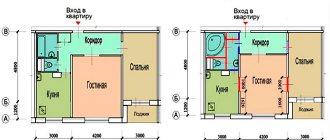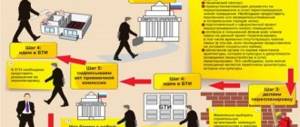Prices for lawyer services on housing issues
Recognizing housing as unsafe is a multi-stage procedure, during which signs of dilapidation and disrepair of housing facilities are identified, legally significant decisions are made with a view to the subsequent resettlement of such houses. To begin the process, it is necessary to establish signs that the house is unsuitable for citizens to live in.
The main signs of a house being in disrepair are related to its service life after construction or major repairs. Such signs include:
- Physical standard wear and tear of a building is calculated based on regulatory rules as a percentage of the condition of the structure at the time of construction.
- The actual wear and tear of the building is determined during the inspection of the capital elements of the structure.
Signs of emergency conditions are the basis for the creation of an interdepartmental commission to inspect the facility. The commission is created on the initiative of local governments and includes representatives of the owner of a residential property, officials of state and municipal housing control bodies, as well as a number of other persons.
The conclusion of the interdepartmental commission allows you to record the signs of a house's disrepair in a legally significant document - the conclusion of the commission. This conclusion will be the basis for a decision by the local government to recognize the house as unsafe.
3 ways to get a free legal consultation 01
-consultant in online chat bottom right
02
Hotline 8 (free consultation in Russia)
03
Request a call back (bottom left button), a lawyer will call you back in 10 minutes
Free consultation with a lawyer on housing issues Prices for lawyer services on housing issues
Recognition of housing as unsafe
Reform of the housing and communal services system is carried out simultaneously in several directions: major repairs of apartment buildings, commissioning of housing for low-income citizens, recognition of housing as unsafe with the subsequent resettlement of citizens.
The implementation of these activities is a priority area of activity for the state. The deterioration of the state and municipal housing stock makes citizens increasingly ask the question: how can housing be recognized as unsafe?
Establishing the legal fact of accidents allows citizens to count on receiving new housing that meets all the requirements and standards of improvement and habitability.
Reasons
If a building's standard wear and tear exceeds the established standard of 70-80%, it is almost inevitable that it will be considered unsafe. How can housing be recognized as dilapidated or in disrepair when the physical wear and tear according to the documents is within acceptable limits, although the actual condition of the housing poses a threat of its destruction?
Owners and tenants of residential premises have the right to apply to the authorized bodies to inspect the property to determine whether it is dilapidated or unsafe.
This statement will be the basis for the creation of a commission that will assess the actual condition of the housing for suitability for habitation.
The provision of municipal services for the consideration of complaints and applications from citizens establishes the obligation of the local government body to respond to each fact of such appeal. The illegal inaction of these bodies to recognize this fact can be appealed by citizens to the prosecutor's office or in court.
If the interdepartmental commission, during its inspection, establishes the existence of grounds for recognizing the house as unsafe, it is obliged to reflect this fact in the conclusion, indicating the possible consequences:
- The house is subject to demolition and resettlement of citizens.
- the house is subject to reconstruction in order to return it to its normal physical condition.
Regardless of these consequences, the local government body is obliged to make a decision to recognize the housing as unsafe after receiving the commission’s conclusion.
Exchange agreement for relocation from emergency housing
If housing no longer meets standards and becomes uninhabitable, it may be considered dilapidated.
Attention! Citizens living under a social tenancy agreement in housing recognized as dilapidated or in disrepair are subject to resettlement in appropriate conditions.
The legislation stipulates in detail the nuances of resettlement:
Federal Law No. 185 of July 21, 2007 provides grounds for the creation of various regional programs that determine the order of resettlement of citizens from dilapidated and dilapidated housing.- Article 85 of the Housing Code directly states that citizens who have entered into a social tenancy agreement must be relocated from unsuitable housing to other comfortable premises.
- Article 86 of the LC has a similar content. With a note: a corresponding rental agreement must also be concluded for the housing provided in return.
- According to Article 89 of the Housing Code of the Russian Federation, compliance standards for new housing are determined. Briefly: it must be no worse than the previous one, be located within the same locality, correspond in size to the previous one, have the same number of rooms, be comfortable and suitable for living. The rules for the provision of municipal housing under a social tenancy agreement and space standards are discussed in a separate material.
- Each region has its own legal acts that determine the procedure and stipulate the specifics of the process.
Article 86 of the RF Housing Code. The procedure for providing residential premises under a social tenancy agreement in connection with the demolition of a house
If the house in which the residential premises occupied under a social tenancy agreement is located is subject to demolition, the citizens evicted from it by the state authority or local government body that made the decision to demolish such a house are provided with other comfortable residential premises under social tenancy agreements.
The contract is for a fee. Its parties have the status of both seller and buyer - they exchange living space on equal terms.
The terms of the purchase and sale transaction may be applied to relationships of this kind, if this does not contradict the essence of the exchange.
We invite you to read: Business investment agreement between individuals
Sample
The agreement contains mandatory information about the parties and stipulates their obligations to transfer apartments free from the rights of third parties.
The timing of the transfer of living space into the ownership of each of the parties, the procedure for resolving disputes and responsibility for the transaction are discussed separately.
The contract is signed:
- on the part of the municipality - by an authorized person;
- citizen - recipient of a new apartment.
A sample exchange agreement for relocation from emergency housing can be provided for preliminary review - before taking legal actions.
Deadlines
From the moment the local government authority receives the commission’s conclusion, a decision must be made within 30 days to recognize the house as unsafe. This period is established by law and entails a number of legally significant consequences:
- The local administration is obliged to take measures to resettle citizens into new housing: draw up a priority list for resettlement, find funds to purchase apartments for resettlement, and resolve disputes with the owners of apartments in a dilapidated building.
- Residents of the house receive the right to demand their relocation from a house that is recognized as unsafe and subject to demolition or reconstruction.
If the local administration within 30 days has not made the indicated decision to recognize the property as unsafe, its inaction can be appealed in court at the suit of the residents of the dilapidated building or authorized supervisory authorities.
Sample application for the provision of housing to replace emergency housing
The interpretation of the law by a high court is very important, since according to statistics there are many such claims throughout the country. One of them is a lawsuit filed by a resident of Yakutsk against city officials. In court, the citizen demanded that the local administration provide her with ownership of housing in exchange for the one that was being demolished. The plaintiff said that the apartment building in which she lives, by order of the city administration, was recognized as unsafe and subject to demolition. The house is included in the regional program for relocating citizens from emergency housing stock.
In addition, housing can be provided in another area of the city, but relocation to it depends solely on the consent of the citizen.
Procedure
The procedure for relocating citizens from a house recognized as unsafe depends on the legal status of the residential premises located in this facility.
Tenants occupying apartments in official housing stock are required to provide new official or departmental housing. Relocation from these premises is carried out at the expense of the owner of the house or the local government body on whose territory the housing is located.
Tenants under open-ended social tenancy contracts are required to provide comfortable housing for relocation in accordance with established standards for the provision of residential premises that meet the requirements of livability and suitability for living.
Owners of apartments in a dilapidated building have several possible options:
- They have the right to agree to move to an apartment offered by the local administration.
- They have the right to refuse to receive such housing and demand payment of compensation for the market value of their apartments.
- They have the right to appeal the amount of compensation for the market value of the apartment.
Regardless of the status of the occupied premises, citizens have the right to demand their relocation from a dilapidated building.
How citizens are resettled from dilapidated housing
If we turn to the Regulations “On recognizing premises as residential premises, residential premises unsuitable for habitation and an apartment building as unsafe and subject to demolition or reconstruction”, approved by Government Resolution No. 47, then it says that in order for housing to be recognized as dilapidated and accepted decision on the subsequent eviction of living citizens from it, an interdepartmental commission is created at the level of the municipality or subject.
We invite you to familiarize yourself with: Sample application to initiate enforcement proceedings
There is another way to “apply” to the commission - you will need to bring the conclusion of an authority that has the legal right to exercise control and supervision functions over the condition of residential premises. The document must state that the housing does not comply with the standards established by law.
A certain package of documents must be attached to the application:
- Residential reconstruction project. (In case the premises are not residential, but need to be recognized as such).
- Copies of documents that can confirm the fact that the applicant has rights to this housing.
- Certificate of housing assessment by an expert organization.
- Other papers that the applicant considers necessary in this case.
The application and package of documents can be submitted in several ways: by mail, in person, through the government services portal or the MFC.
When the papers are accepted for consideration, the commission checks them within a month and decides whether an additional inspection of the house/living space is required. The applicant expects one of the following decisions:
- The premises need major renovations;
- You can live in the premises, that is, it is suitable for this;
- The house is considered unsafe and must be demolished;
- The premises need to be redeveloped or reconstructed;
- The house is recognized as unsafe and requires reconstruction;
- The housing is not suitable for living as it does not comply with the standards prescribed by law.
The commission may decide that the premises are not suitable for habitation, and the citizens living there must be resettled.
If the application was submitted through the government services website or through a post office, then from the moment the corresponding decision is made, the commission is obliged to send it to the landlord, applicant or the relevant government authority within five days.
When considering the question of how owners are resettled from dilapidated and dilapidated housing in its main key, it is necessary to understand that the mechanism for eviction from dilapidated housing depends on the category to which the given housing belongs:
- State housing stock;
- Municipal housing stock;
- Private housing stock.
When citizens are evicted, they are entitled to claim certain “compensation measures.” It can be:
- Payment of redemption price;
- Providing equivalent accommodation in the event that the owner is evicted;
- Issuance of another residential premises under a social tenancy agreement.
Let’s take a closer look at these three “compensation” options;
Payment of the redemption price: if we refer to Article 32 of the Housing Code, it states that if the owner of the property is not provided with premises for housing, then in the event of eviction, he may be paid the redemption price. It consists of the market value of the apartment and the costs incurred by the owner in the process of moving and preparing title papers for the apartment.
In addition, this price includes lost profits. An agreement can also be reached with the owner that, in exchange for the housing that is being “repossessed,” he will be given another, and its cost will be included in the redemption price. There are cases when the owner does not like the proposed price, then he has the right to discuss this issue with an official of the relevant government authority.
Practice shows that a significant portion of disputes in court relate to the fact that the state “artificially” lowers the redemption price. The owner of a dilapidated property has no choice but to agree to these unfavorable conditions. When the owner is not satisfied with this state of affairs, he has one option - to file a lawsuit.
There are cases related to determining the component of the redemption price. For example, a residential building is located on a plot of land, so its cost must be included in the purchase price. A number of courts agree with this state of affairs, citing the following arguments: the accessory (which is a piece of land) must follow the fate of the main thing (which is an apartment). Therefore, this moment must be taken into account in the redemption price.
Important point: The regulation of the procedure and consequences of the seizure of residential real estate are prescribed in Article 32 of the Housing Code of the Russian Federation. Despite this, the provisions of this regulatory document also apply to cases of relocation of owners from dilapidated housing. But one condition must be met here - it is owned by the persons who live in it.
As part of the question of how owners are resettled from dilapidated and dilapidated housing, it is impossible to ignore the topic of major repairs and reconstruction. When renovations or major repairs to a building are carried out that require the occupants to move out, the landlord is required to provide alternative housing for occupancy.
- Citizens who lost the right to premises due to failure to fulfill contractual obligations in which housing acted as collateral;
- Citizens living under social loan agreements in premises where the plans include reconstruction or major repairs;
- Citizens who had the only housing, but they lost it due to the occurrence of emergency circumstances;
- In other cases specified by law.
If tenants do not consent to eviction, they can be forcibly evicted and for this, the authorized bodies receive a corresponding court decision. The right to return to the premises where reconstruction or repairs were carried out remains with the tenant, and this point does not depend on the period of work.
This rule is not without exceptions: if after reconstruction or repair the square meters have been changed so much that the standards for living space per citizen are not met, then the citizen can no longer return to the premises that he occupied before. The opposite situation may also occur, when square meters have increased, and, accordingly, the standard of living space per person has increased. In this case, refusal to move in is also guaranteed.
We invite you to familiarize yourself with: Sample application for restructuring a loan from Russian Agricultural Bank
Where to go
To exercise their right to relocate housing, residents of a dilapidated building have the opportunity to contact the following authorities:
- To the municipality - to create an interdepartmental commission to recognize the house as unsafe.
- To the local administration - to include a dilapidated house in the resettlement program using funds from the Housing and Communal Services Reform Fund.
- To the local administration - for relocation from a house officially recognized as unsafe.
- To the prosecutor's office - to eliminate violations of the right to resettlement caused by illegal actions or inaction of officials.
- To institutions of state control and supervision in the field of housing law - to protect the right to decent living conditions that meet the requirements of norms and regulations.
- To the courts - to restore violated rights and forcibly provide housing for relocation from a dilapidated house.
To apply to each of these authorities, you must send an application accompanied by documents confirming the recognition of the fact that the building is in disrepair and the right to relocation.
Documentation
The main documents submitted by residents of a dilapidated building when protecting their rights include:
- Title documents for residential premises - lease agreements, extracts from the Unified State Register of Legal Entities, technical documentation.
- Documents confirming the unsuitability of housing for habitation - acts of inspection of living conditions, conclusion of an interdepartmental commission, technical documentation for a residential building.
- Decisions of local authorities on the issue of recognizing housing as unsafe, or refusing to recognize this fact.
The first step in the process of relocation from a dilapidated house will be an application for recognition of the dilapidation and disrepair of the object, which is submitted with the aim of creating an interdepartmental commission.
Sample application to the interdepartmental commission
To recognize a home as dilapidated, it is necessary to submit a corresponding application on behalf of the residents of the house to a certain organization. Based on this document, a special commission is created that resolves such issues. As a rule, it includes housing and communal services workers, BTI specialists, designers, representatives of executive authorities, etc.
— residential premises located in dangerous zones of landslides, mudflows, snow avalanches, as well as in territories that are annually flooded with flood waters and in which it is impossible to prevent flooding of the territory using engineering and design solutions should be considered unsuitable for living.
27 Apr 2020 yurisaktobe 303
Share this post
- Related Posts
- Nurse Skills for Resume
- How to correctly write about penalties in a contract
- The marking line is broken on one side and solid on the other.
- Number of parking spaces for a residential building
Sample application
An application for dilapidated housing is submitted by citizens who legally live in a house that shows signs of disrepair. A sample application for recognizing a house as unsafe can be obtained from the local administration.
This application must be accompanied by documents confirming the right to legal residence in the specified house (lease agreement, certificate of ownership, etc.). In addition, documents are attached confirming the existence of grounds for recognizing the housing as unfit for habitation.
Sample application to the interdepartmental commission for recognizing houses as unsafe
on the compliance of the premises with the requirements for residential premises and its suitability for habitation; on identifying the grounds for declaring the premises unfit for habitation; on identifying the grounds for recognizing an apartment building as unsafe and subject to reconstruction; on identifying the grounds for recognizing an apartment building as unsafe and subject to demolition. Fill out the feedback form. Describe your question in as much detail as possible in simple words. For a written response, please include your return email address.
The legislation of the Russian Federation obliges officials to provide them with new living quarters instead of those that have fallen into disrepair. This procedure is possible only after their current home is recognized as unsafe or subject to demolition. The decision on this status is made by an interdepartmental commission.
Providing new housing
Recognizing housing as unsafe and providing new housing is the responsibility of state and municipal authorities. The legal fact of recognizing that a house is in disrepair allows one not only to count on possible relocation to new housing, but also provides the right to demand forced resettlement through the court.
Recognition of housing as unsafe
is the most important legally significant act that allows citizens living in dilapidated and dilapidated housing to obtain the right to state support measures.
Author of the article: Petr Romanovsky, lawyer Work experience 15 years, specialization - housing disputes, family, inheritance, land, criminal cases.







